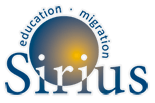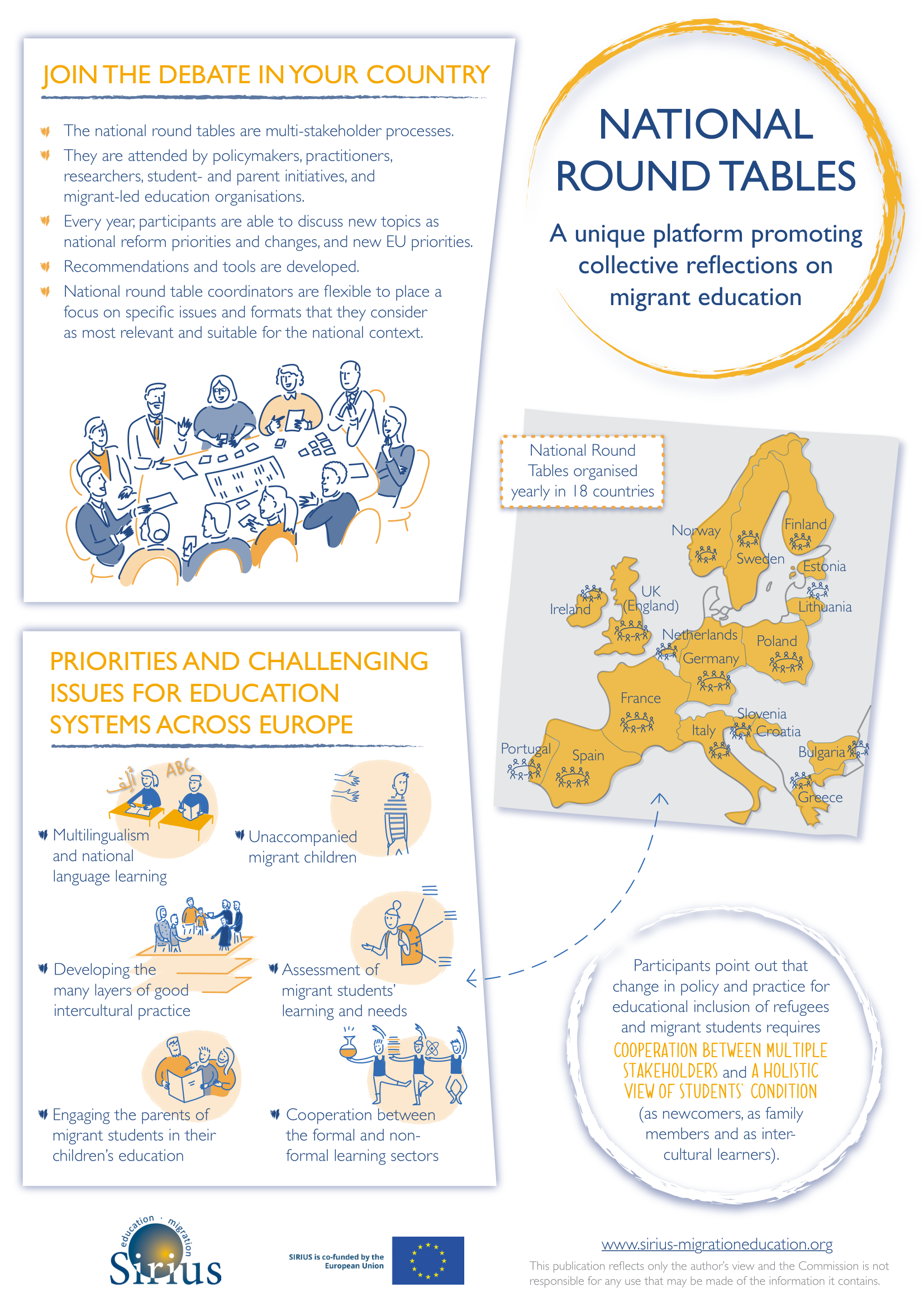The SIRIUS Policy Network on Migrant Education was the first EU-focused actor to publish a statement with policy recommendations for education systems in the post Covid-19 era. This was released several weeks into the uniform school closures across the EU. As a multi-stakeholder initiative that uses inclusive mechanisms to advocate for inclusive education policies, we are seeking a relationship with a forward-thinking foundation who wishes to be part of a new world that we are helping to build in the post Covid-19 era. This relationship will allow us to use our unique capability to connect and mobilise a wide network of actors to weave resilience into our educations systems so that they can respond to anticipated trends and threats. See our statement on Covid-19 below released 20th April 2020.
Moving Educational Policy Forward After Covid-19
A SIRIUS Perspective
We are now several weeks into a ‘lockdown’ resulting in almost uniform school closures across the European Union. Several countries intend to start back at school this week or in early May. In an effort to support these countries and others still undergoing school closure, the SIRIUS Policy Network on Migrant Education has collaborated on this statement to produce guidance moving forward.
During this pandemic we have seen many Ministries of Education instruct schools to move to various forms of distance-learning. Yet availability of advice, tools, guidance and support to do so, as well as preparedness of schools to implement such a shift smoothly, has been very mixed. The OECD “Framework to guide a response to the Covid-19 Pandemic” reports that a large number of countries surveyed offered no initial guidance to “support the ongoing academic instruction of schools”. However, in many European Union countries we saw a slightly better response. Many countries are broadcasting educational programs on national television (Portugal, France, Belgium, Latvia, Serbia, Romania and more) and some countries have launched specific websites or worked with technological providers (Czech Republic, Romania) to deal with the delivery of educational content.
Some countries already had their educational content on-line (Estonia) whom, in particular have been key in sharing learnings from their past experiences with other countries. In addition, in some countries, the Ministry of Education has quickly produced tools and guidance for schools and has been active in supporting teacher implementation of digital learning (Finland, Estonia, Latvia, Italy, Denmark and more.)
With all this work in place, the 2nd Education EU Council meeting on the Covid-19 pandemic held on 14th April 2020 demonstrated that the battle is not yet won when it comes to catering to the needs of vulnerable learners, including migrant students, and in general inclusive education. As mentioned by Blaženka Divjak, Croatian Minister of Science and Education, social equity and teacher support/development remain challenges for the group as a whole.
As a network of researchers, policy-makers and migrant-led initiatives, SIRIUS has been collecting information from their members on current practice. We have turned this into initial policy implications for both Member States and the European Union. We must use the lessons of this experience to improve and weave more resilience into our education systems thereby making them more inclusive for all.
Pdf copy here
Member State Level
Inspiring Practice – Individualised support
SIRIUS Member Don Bosco shared this from their Spanish Member Pinardi Federation of Social Platforms of the Community of Madrid. “At Pinardi we work with all the members of the family…For this reason, the first days from our homes, an individualized follow-up was carried out on all the families to continue offering our accompaniment and to inform how to do it in a different way, to know their particular situation and to be able to support, as we have been doing until now: psychological support, educational and directed leisure ”, says Marta Raimundo, head of communication for the Pinardi Federation of Social Platforms of the Community of Madrid.
Policy Implication – Mainstream and expand the application of Individualised Education Plans
Many countries already employ an ‘Individualised Education Plan’ for students with special needs, such as learning needs or non-native language needs. The plans should include an element on communication between teachers and families/students during crises to ensure there is a regular check-in and support. The plans could also include a student or family-directed self-assessment of ‘readiness for distance learning’ including factors such as availability of a computer, tv, high-speed internet and a quiet desk area to work on.
Inspiring practice – Providing digital literacy lessons through phone calls
As SIRIUS member Terremondo, based in Italy has experienced, “some students and families have a low level of digital literacy and in some cases are unable to sign-up to the various services offered.” This means that students and parents of young students that are helping their children connect to the internet and use novel platforms are struggling to continue the learning experience.
Policy Implication – Improve school provision of digital literacy education for students AND parents (particularly parents of young children)
Whether part of a pandemic/school shut-down response plan or not, schools need to ensure that all students and in particular families have the digital skills to get their children online and learning on the first day of school shut-down. Parents may need non-native instruction or guidance and any guides or materials should be translated into all languages that are present within the school community. These sessions should also undertake the administrative aspects of students and families signing up to any services that can facilitate the regular communication between parents and the school and will be used during school closures.
Inspiring practice – Use of social media to keep up motivation with adolescents
SIRIUS member Don Bosco shared this from their partner in Italy.
“motivational initiatives through social networks which [adolescents and youth] can access privately, such as Instragram [have been successful] at the María Auxiliadora Foundation.”
Policy Implication – Ensure ‘understanding social-media’ is included in professional development for school social support workers and teachers.
Youth workers, school psychologists and educational social support personnel working with adolescents already have a strong understanding of the importance of peer and adult relationships in motivating adolescents. Moving this knowledge to the practical realm of how to use online social networks to positively impact motivation for adolescents will be critical in aiding these workers to continue their functions during times of digital learning. In-loco training and practice in regular school-time should occur.
Inspiring Practice – Recognising increased vulnerabilities in certain communities to adhere to educational time-table.
Our member ETUCE reports that French Union SNES-FSU is lobbying the government for a solution that “does not unfairly penalise the students who [are] expected to sit exams this year, especially those in poorer or more vulnerable communities.”
Policy Implication- Providing opportunities for inclusive policy-making
Vulnerable students may struggle more in terms of exam preparation, pace of learning, access to computers and internet more than others during this time. Member states should ensure that the voices of vulnerable students including migrant students and families are included in decision-making at this present time.
Inspiring Practice – Activating peer networks for non-native speakers
The nature of on-line interaction can make it challenging for non-native speakers, particularly young children to get enough ‘talk-time’ and ‘listen-time’ with peers to continue the improvement of the native/medium of instruction language. Our member Terremondo worked to connect non-native peers with native-speaking peers to ensure that they have a higher opportunity to interact socially in the native language.
Policy Implication – Foster an on-line whole school community approach
Schools provide a rich socio-linguistic feeding ground for non-native students to integrate. Being cut off from this environment has adverse linguistic and educational impacts. Fostering a whole school online community approach within schools (peer relationships, mentoring) builds real relationships both on-line and in person that can become a necessary life-line for students and families when schools close.
EU Level Actions
Inspiring Practice – Providing computers and devices to students and families in need.
Our member Minderheden Forum in Belgium, and many other migrant organisations (HumanAid in Vinius, Lithuania) are providing laptops and digital devices to migrant students who do not have them.
Policy Implication – Utilise Digital Education Action Plan to mobilize funding for hardware for schools (and families) in need.
Action 1 of the plan discusses financing and vouchers for connectivity but not hardware for schools. Hardware could also be discounted or vouchers made available so that schools are able to allow students from vulnerable backgrounds to continue learning at home during non-school time and in the future event of school closures. Current data from PISA (2018) shows that there is a significant difference between the educational attainment of students who have a computer at home that they can access for learning and students who do not.
Inspiring Practice – Recognise the social divide, not just digital
While it is recognized that the digital divide is a massive barrier to educational equity both from the perspective of technology in schools and technology in homes (Despite a 15 billion euro investment in the period 2014-2020, the goal of providing high-speed internet in all homes in the EU (necessary for streaming on-line classes) will not be met by the end of this year.) As seen above, all our members across the EU are actively working hard to access those that are socially excluded from the digital learning experience.
Policy Implications – Lead on social equity
We encourage the European Commission to lead on true equity in education by adding an additional point on their Digital Education Action Plan to recognize the importance of overcoming the social divide.
Inclusive education means that each learner has their strengths, challenges, and personal set of circumstances. It means that methods used to reach each student and deliver content need to be adapted to their particular situation. More well-funded user-centred/led research with migrant and vulnerable students and families at the heart should be funded.
Inspiring Practice – Estonia Ministry of Education and Online preparedness
Our member PRAXIS in Estonia shared the following details on Estonia’s smooth move to digital education during this pandemic. “When schools in Estonia switched to the remote-learning system on 16 March 2020, the number of users of e-learning platforms increased by ten folds. The smooth transfer was ensured by regular use of national electronic homework diaries/communication points eSchool and Stuudium by all schools. Investment for good internet connection, development of electronic study materials and development of teachers´ digital skills benefited the situation. Over the past years, the schools have been able to apply for funds to develop the areas where their school needs most support – from obtaining computers and training teachers to composing strategic plans for IT developments.”
Policy Implications – Overcoming structural inequalities and forward-looking responses, rather than isolated reacting
The EU should incentivize Member States to act seriously and prepare an education system shut-down plan which not only includes actions related to the move to digital learning but guides local education authorities, schools, school directors, teachers and other school support staff on their domains of responsibility for future shut-down occurrences. The plans should encourage all parties to work together and build on the resilience that has already been weaved into the system by ensuring inclusive policy-making occurs.
Sources
A framework to guide education response to the COVID-19 Pandemic of 2020
https://www.hm.ee/sites/default/files/framework_guide_v1_002_harward.pdf
Education ministers discussed the challenges of the distance learning
https://eu2020.hr/Home/OneNews?id=243
Soluciones Originales Compromiso Esfuerzo Frente La Crisis La Covid-19
https://psocialessalesianas.org/soluciones-originales-compromiso-esfuerzo-frente-la-crisis-la-covid-19/
Il Coronavirus ci mette tutti alla prova
https://www.salesianiperilsociale.it/noicisiamo/?utm_source=twitter&utm_medium=organic&utm_campaign=messaggio-don-roberto-coronavirus&utm_term=post-organico
PISA data explorer
https://pisadataexplorer.oecd.org/
Broadband in the EU Member States: despite progress, not all the Europe 2020 targets will be met
https://op.europa.eu/webpub/eca/special-reports/broadband-12-2018/en/











